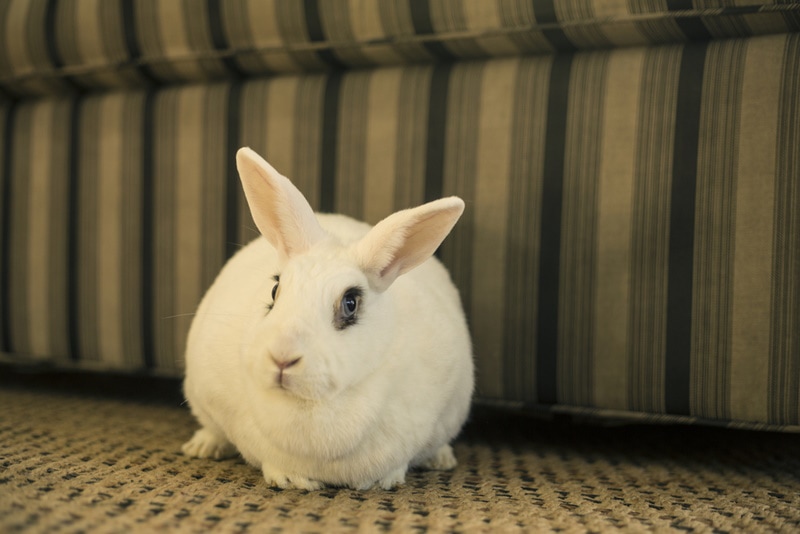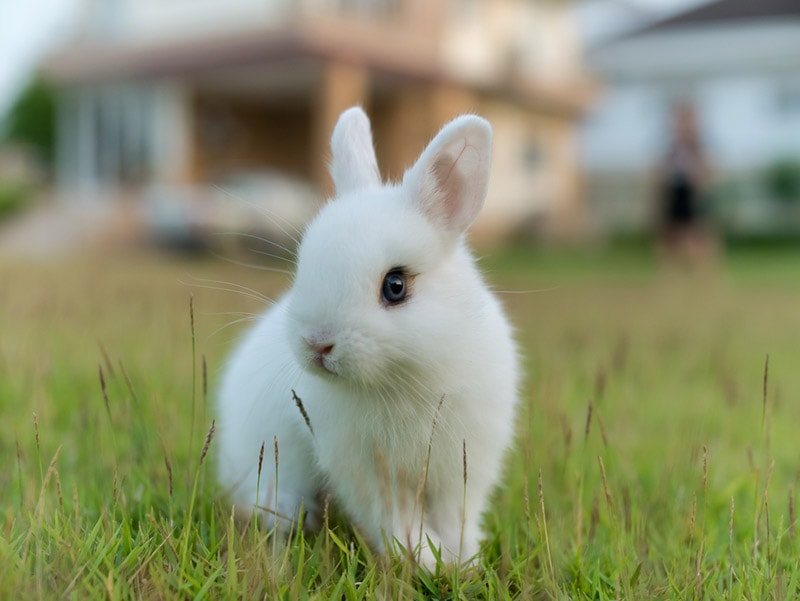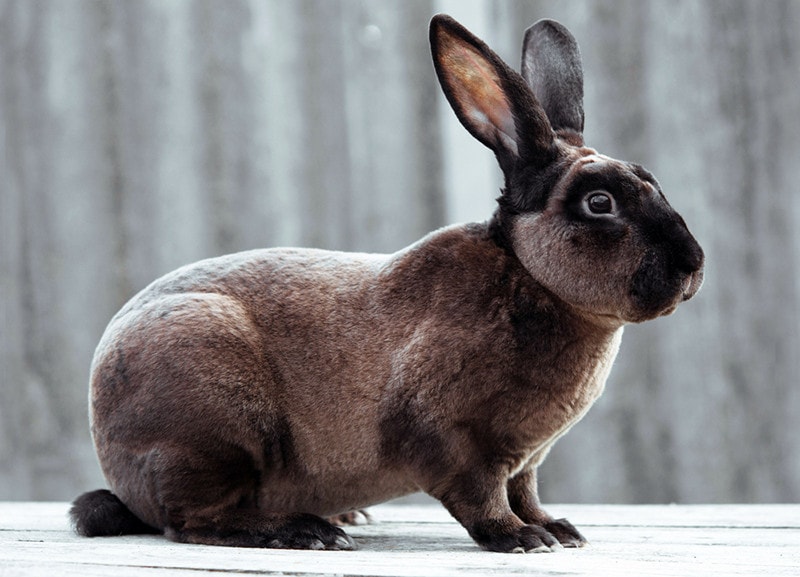How to Tell If Your Rabbit Likes You: 5 Signs to Look For

Updated on
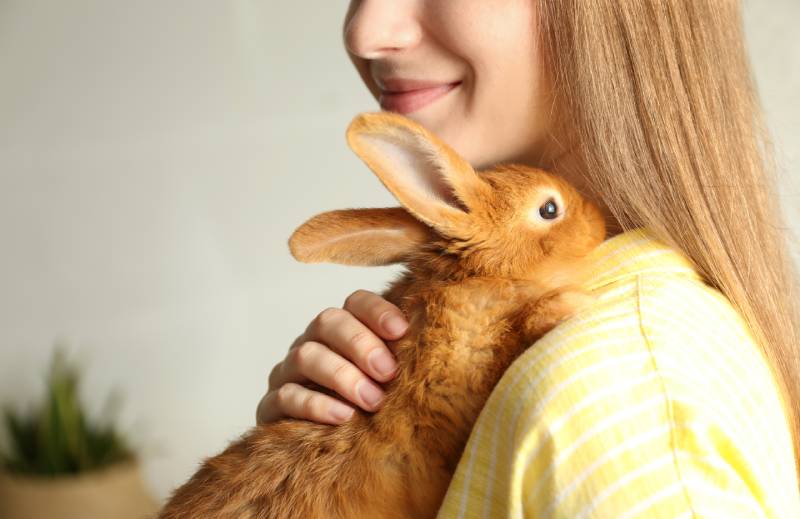
Click to Skip Ahead
Rabbits are social creatures and can form strong bonds with their owners. There are a few key signs that your rabbit enjoys spending time with you. Here are 5 signs to look for if you want to know if your rabbit likes you:
The 5 Signs How To Tell If Your Rabbit Likes You
1. They Make Eye Contact or Follow You
If your rabbit is constantly looking up at you, or follows you around the house, it’s a sure sign that they have developed a bond with you. Additionally, if your rabbit comes running to see you when you walk into the house, it means they have missed spending time with you while were away! If your rabbit leaps up in excitement whenever they catch sight of you – even from afar – it means they are truly delighted to have the chance to spend time with you!

2. They Listen to You
If your rabbit responds to their name and comes running when you call out to them, it is another strong indication that they enjoy spending time with you. If your rabbit’s ears perk up whenever you speak to them, it is a sure sign that they are interested in what you have to say and truly enjoy spending time with you!
3. They Make Physical Contact With You
Rabbits often display affection towards their owners by nudging them or rubbing against their legs as a sign of love. Also, if your rabbit doesn’t mind being picked up and snuggles into your arms, they are showing you their trust and affection. Rabbits may often seek out the warmth of their owners’ laps, or even snuggle up alongside them on the couch. This is a sign that they love being close to you and feel safe in your presence.
Rabbits tend to only tolerate being petted for short periods of time if they don’t trust the person – but if your rabbit allows you to pet them for extended amounts of time, it is a sign that they love spending time with you.
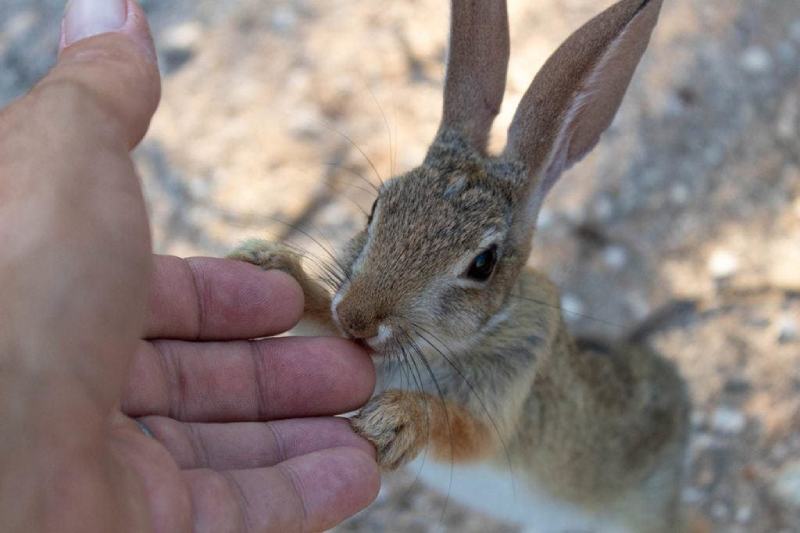
4. They Bring You Gifts
If your rabbit brings over pieces of their food as an offering, this is one of the most touching displays of love and trust. Also, if your rabbit brings over a toy or some food to offer to you, it is a sure sign that they feel comfortable and happy around you and want to show their appreciation for you!
5. They Vocalize With You
Rabbits make various noises to show their appreciation for their owners, including soft purring or gentle huffing. They may also bark or thump their feet to let their owners know that they want some attention from them!
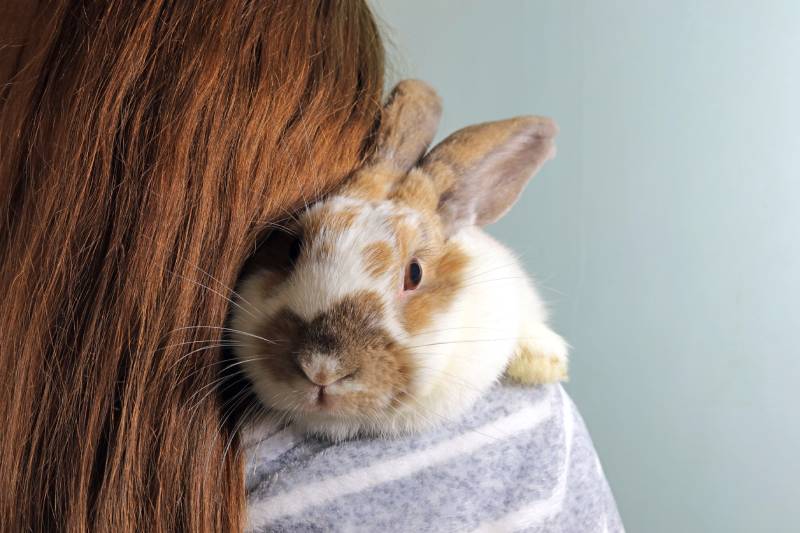
Signs Your Rabbit Is Uncomfortable With You
These above signs indicate that your rabbit likes spending time with you and enjoys interacting with you! However, it is important to recognize other signs that can mean your rabbit doesn’t enjoy being around you:
- Aggressive behaviors, such as biting or scratching.
- Excessive vocalizing, like screaming or hissing.
- Refusing treats they would normally take from you.
- Hiding in their hutch to avoid interaction with you.
- Staring at you without blinking or making any other movements (this is a sign of fear).
If you notice any of these signs, it could mean your rabbit is feeling uncomfortable around you and may need some extra attention and care! Be sure to monitor your rabbit’s behavior carefully and get help if needed to ensure they are healthy and well-adjusted. Also, consider implementing some tips for forming a strong bond with your rabbit – such as spending quality time together, providing mental stimulation and enrichment activities, and understanding their body language – to help strengthen your relationship.
Signs Your Rabbit Is Sick or Distressed
It is important to know that some of the signs that your rabbit is uncomfortable can also indicate your rabbit is in distress or even injured or ill. If you notice any sudden changes in their behavior (such as lethargy, loss of appetite, etc.) it is best to take them to the vet immediately so they can receive proper care and treatment.
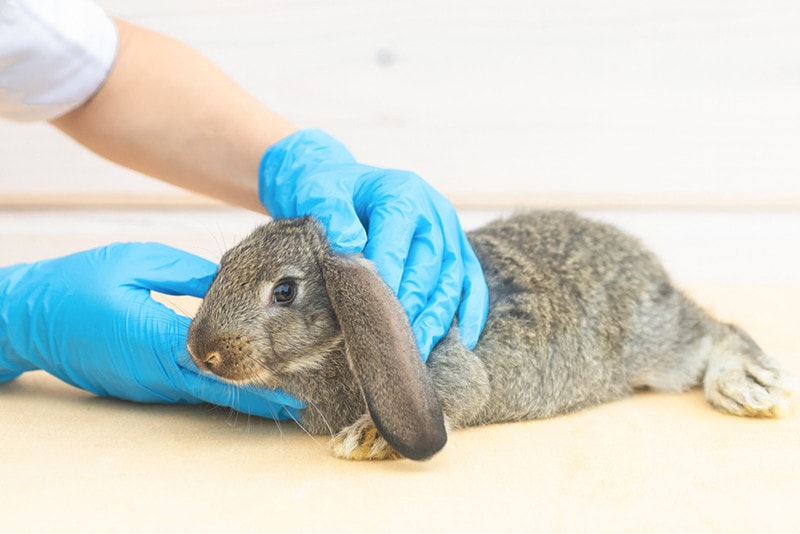
Top 10 Crucial Tips for Forming a Strong Bond with Your Rabbit
- One: Spend time with your rabbit every day – even just 10 minutes of quality time can make a big difference in their emotional wellbeing.
- Two: Provide them with plenty of enrichment activities to keep their minds active, such as playing hide and seek or providing them with puzzle toys to solve.
- Three: Learn how to read your rabbit’s body language so you can recognize when they are feeling scared or unhappy.
- Four: Offer treats as rewards for good behavior and positive reinforcement whenever possible.
- Five: Talk to your rabbit often in a soft, soothing voice to help strengthen the bond between you two.
- Six: Don’t forget about physical contact! Rabbits need affection too, so make sure to give your rabbit some pets and scratches every day.
- Seven: Let your rabbit explore their environment – supervised of course! Giving them plenty of room to hop around will help keep them active and engaged.
- Eight: Provide a secure place for your rabbit to hide away when they’re feeling shy or scared, such as a cardboard box or a cozy blanket fort.
- Nine: Offer interactive toys such as balls and tunnels so that your rabbit has something fun to do while you’re away from home.
- Ten: Always be patient with your rabbit – remember, it takes time to form a strong bond that is built on trust and understanding!
Activities to Do with Your Rabbit
- Play hide and seek – This can be a great game for both you and your rabbit! Simply hide some treats around the house and let your rabbit find them with their nose.
- Go for a walk together – Many rabbits love to go on walks outside, so if yours is one of them, make sure to bring along a harness and leash to keep them safe.
- Create obstacle courses – Set up obstacles like cardboard boxes or small tubes in your home that your rabbit can hop over, crawl through, or climb onto as they explore their environment while getting exercise too!
- Give them space to run around – Provide plenty of open space where they can run back-and-forth while you supervise from a distance.
- Teach them tricks – Training your rabbit can be a fun and rewarding experience for both of you! Start with simple commands like “sit” or “come”, then move on to more complex ones like weaving through poles or jumping through hoops.
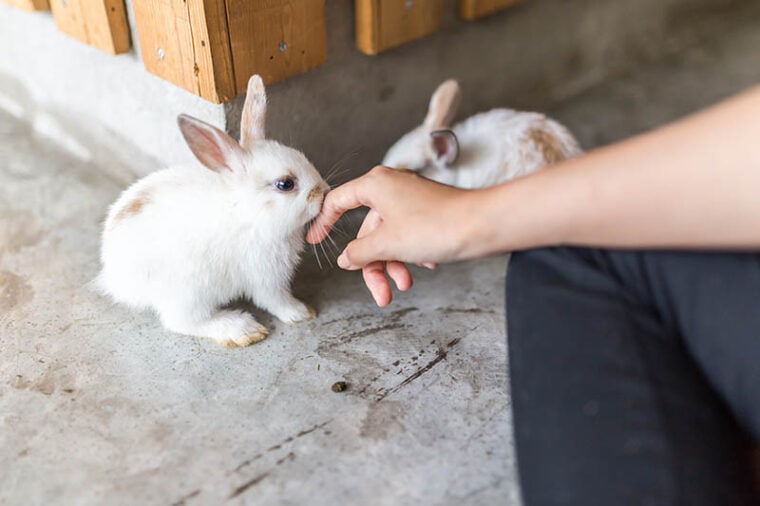
Top 10 Fascinating Facts About the Relationships Between Humans and Rabbits
- Scent Markers: Rabbits can recognize their owners by scent.
- Affection: They rely on physical affection from their owners for comfort and security.
- Bonding: A rabbit’s bond is often compared to the bond between a dog and its owner!
- Social Hierarchies: Rabbits form social hierarchies within households like other species do in the wild (like wolves).
- Verbal Communication: They are capable of responding to verbal cues from humans, such as “sit” or “come here”.
- Security: Rabbits are less likely to bite or scratch if they feel secure in their environment.
- Activities: Rabbits can get bored easily and need mental stimulation to stay happy and healthy.
- Lifespan: They can live for up to 10 years with proper care!
- Friendships: Rabbits are capable of forming strong friendships with other rabbits as well as humans.
- Scalability: They love to be around people but may not always show it in obvious ways!
FAQ About Rabbit Behavior and Communication
Q: How do I know if my rabbit is happy?
A: A happy rabbit will have bright eyes, floppy ears, and be moving around with enthusiasm. They may also make grunting or purring noises to show contentment.
Q: What are some signs that my rabbit is scared?
A: If your rabbit seems anxious or scared, they may flatten their ears against the side of their head and “freeze” in place. They may also thump their feet to make loud noises in order to warn predators away.
Q: How can I let my rabbit know I’m happy with them?
A: One way to show your rabbit that you are pleased with them is to give them a treat or stroke their fur as positive reinforcement. You can also use soft vocalizations and body language to express your happiness, such as blinking slowly and nodding your head.
Q: Do rabbits need vaccinations?
A: Yes, it is important to have your rabbit vaccinated against common diseases such as myxomatosis and viral hemorrhagic disease (VHD). Ask your vet about the best vaccination schedule for your rabbit.
Q: Is it safe to keep a rabbit indoors?
A: Yes! It is perfectly safe to keep a rabbit as an indoor pet as long as they are provided with plenty of space and enrichment activities to keep them active and engaged.
Q: Do rabbits get along with other animals?
A: It depends on the individual rabbit – some may be more social and friendly towards other pets, while others may be more timid or skittish around them. If you plan on introducing another animal into your home, make sure to do so carefully and gradually.
Q: How much exercise do rabbits need?
Rabbits should have at least an hour of exercise every day, either supervised outdoors or in a safe area indoors.
Q: Is it possible to litter train your rabbit?
Yes! Many rabbits can be trained to use a litter box, just like cats and other small animals.
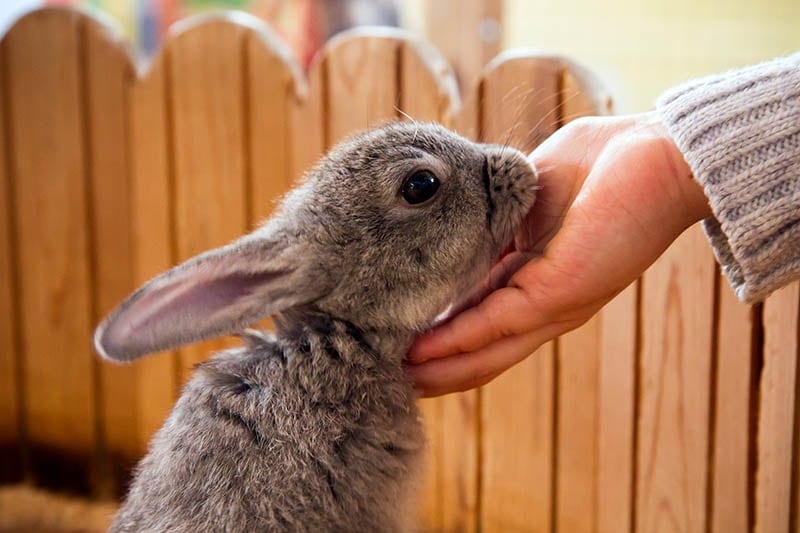
Conclusion
Now that you know more about establishing a bond between yourself and your rabbit through understanding body language, activities, and tips – you should be able to tell when your rabbit is happy and content with you around them! Whether your rabbit is showing signs of joy or distress, use these 5 signs and fascinating facts to better understand their behavior and form a strong bond.
See also:
- Why Do Rabbit Noses Twitch and Wiggle? The Interesting Answer
- Why Does My Rabbit Follow Me? 12 Likely Reasons
Featured Image Credit: New Africa, Shutterstock

